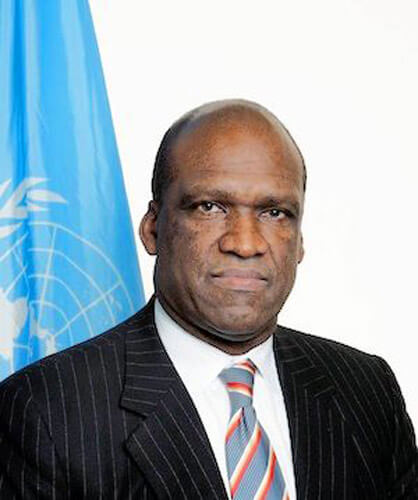Antigua and Barbuda’s Ambassador to the United Nations, John W. Ashe, says freedom of expression and freedom of the press are “fundamental rights” that form an “essential pillar” of democratic societies.
“When journalists are able to report freely, they support informed citizen participation in political and social processes and promote civic engagement,” said Ashe, who is also president of the U.N. General Assembly, as the United Nations on Saturday marked World Press Freedom Day with an appeal to all States, societies and individuals to actively defend press freedom as a “fundamental right” and as a “critical contribution” to achieving and sustaining the Millennium Development Goals (MDGs).
Ashe recalled that, in December 2013, the Assembly adopted for the first time a resolution condemning all attacks and violence against journalists and media workers, and proclaimed Nov. 2 as the International Day to end Impunity for Crimes against Journalists.
“Our Assembly called upon member states to promote a safe and enabling environment for journalists to perform their work independently and without undue interference,” the Antiguan envoy said.
“In this regard, the U.N. Plan of Action on the Safety of Journalists and the Issue of Impunity is an important multi-stakeholder mechanism,” he added, stating that “only by ensuring that journalists can work safely and without fear will they be able to give voice to those who do not have one, tell stories that are untold and help build open and transparent societies.”
U.N. Secretary General Ki-moon and Irina Bokova, director-general of U.N. Educational Scientific and Cultural Organization (UNESCO), said U.N. bodies are already working together and with other partners, under UNESCO’s leadership, to create a “free and safe environment for journalists and media workers around the world.”
They stressed in their joint message that, this year, the international community has a “once-in-a-generation opportunity” to prepare a long-term agenda for sustainable development to succeed the MDGs when they end in 2015.
“Successfully implementing that agenda will require that all populations enjoy the fundamental rights of freedom of opinion and expression,” said the U.N. officials, underscoring that those rights are essential to democracy, transparency, accountability and the rule of law.
“They are vital for human dignity, social progress and inclusive development,” they added.
World Press Freedom Day, which was designated as May 3 in 1993 by the U.N. General Assembly, was marked in about 100 countries.
UNESCO is holding an international conference, entitled “Media Freedom For a Better Future: Shaping the Post-2015 Development Agenda”, on Monday and Tuesday in Paris.
Also marking the Day, 31 specialists from the largest body of independent experts in the U.N. Human Rights system called on all Governments to promote and protect the rights to freedom of expression and information, freedom of peaceful assembly, and freedom of association and public participation.
They said the protection of these fundamental freedoms is essential for full realization of all human rights for all and for the achievement of related development goals.
“States must develop more inclusive political processes and allow the media to play a key role in guaranteeing the right of everyone to freely access information and engage in meaningful development related discourse,” said the experts, known as Special Procedures of the Human Rights Council.
They comprise the organization’s largest body of independent fact-finding and monitoring mechanisms that address either specific country situations or thematic issues in all parts of the world, the U.N. said.
“Without free media to advocate for and monitor the implementation of the new set of post-2015 targets, there can be no real development for all marginalized, vulnerable or discriminated against – not now, not ever,” declared the experts.























